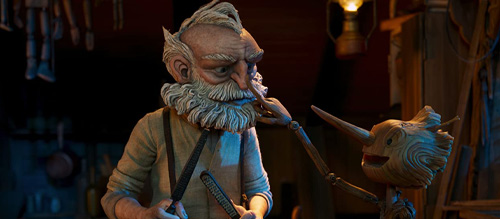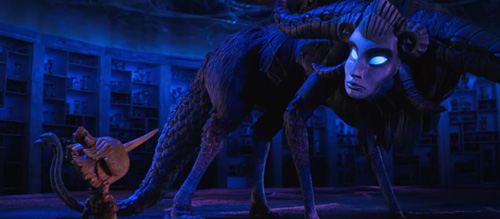Guillermo del Toro’s Pinocchio (2022) Review

Guillermo del Toro’s Pinocchio (2022)
Directors: Guillermo del Toro, Mark Gustafson
Screenwriters: Guillermo del Toro, Patrick McHale
Starring: Ewan McGregor, David Bradley, Gregory Mann, Christoph Waltz, Tilda Swinton, Ron Perlman, Finn Wolfhard, Cate Blanchett, Burn Gorman, John Turturro, Tim Blake Nelson
“Pinocchio” adaptations are like buses, apparently; you wait for one for ages and then three come along at once.
Guillermo del Toro has often spoken of a few key formative texts that have influenced his storytelling through the medium of film from the very beginning. One is Mary Shelley’s “Frankenstein” and another is Carlo Collodi’s “The Adventures of Pinocchio”, which he brings to striking life in stop-motion animation for Netflix here.
In a reimagining of the classic children’s story re-staged to take place in the lead up to WWII and the rise of Mussolini’s fascist Italy, Sebastian J Cricket (Ewan McGregor) recounts the tale of woodcarver Geppetto (David Bradley) who makes a puppet to replace his beloved son Carlo (Gregory Mann) whom was lost to a bombing raid. Hardly any time at all after Pinocchio (also voiced by Mann) is brought to life by magic, he is separated from his father and exploited by many parties interested in the potential of an immortal wooden being.
“No art form has influenced my life and my work more than animation, and no single character in history has had as deep of a personal connection to me as Pinocchio.” – Guillermo del Toro
The sheer amount of detail packed into every hand-crafted frame is truly staggering. Every environment buzzes with life, every incidental background character seems to be on a journey of their own taking place just off-screen. From the moment we see the meticulousness of Geppetto’s craft, how much love he puts into every stage of shaping an unremarkable lump of wood into something useful, or something beautiful, we get the unmistakable sense that the team of animators working on the film are putting just as much of themselves into their own craft.
This Pinocchio definitely feels of a piece with del Toro’s other period pieces that discuss the innocence of childhood ended by warfare, The Devil’s Backbone and Pan’s Labyrinth, and it’s no wonder as he has said in interviews that he considers them a thematic trilogy.
You find yourself thinking of such dark satires as Jojo Rabbit in the terrifying scenes of fascist soldiers preparing child recruits with war games while extolling the virtues of fanatical nationalism. This is the very creepy substitution for the boys being kidnapped and transformed into donkeys seen in most versions of the story.
Del Toro famously loves his monsters and he isn’t afraid of making his Pinocchio monstrous to an extent. The horror-tinged spidery way he moves when he first wakes up and springs at a terrified Geppetto (he just wants a hug), and the manner in which he is broken down and rebuilt multiple times throughout the film, is rather disturbing and at odds with his positive, affable personality. The wooden boy is understandably confused and saddened at the reaction he provokes at church when the congregation are proclaiming him as something unnatural and sinful with one breath, and worshipping a wooden Jesus on the cross the next.

About 40 minutes into this latest take on Pinocchio you might be feeling like it’s a pretty standard re-telling of the story using the most labour-intensive form of animation there is. But then the wooden boy ends up in a kind of limbo, escorted by undead rabbits to an audience with the sphinx-like Angel of Death (Tilda Swinton), and you realise that only del Toro would tell the tale quite like this; Gothic and metaphysical. All versions of “Pinocchio” are about love and what it means to be human, but no other version is as explicitly about death and living with grief.
A debate that went semi-viral recently with the release of Henry Sellick’s Wendell & Wild was how little credit stop-motion directors receive compared to their big name collaborators who have also made live-action films. It’s known as Tim Burton’s The Nightmare Before Christmas because he conceived it and produced it, but many forget that Sellick was the director and was there every step of the way. While there’s little doubt that del Toro was more hands-on here than Burton ever was, you have to give credit to his co-director Mark Gustafson for the day-to-day guiding of the project and being an essential part of making the animation come to life.
As per usual with del Toro’s work, humanity is far more monstrous than anything otherworldly. The characters are a mixture of those from Collodi’s story (Pinocchio and Geppetto, the Cricket, Candlewick) and new creations to fit the time and place this version is set in. Ron Perlman’s sinister fascist officer Podestà not only serves the same story function as the Coachman from Collodi’s story but could also conceivably be the Italian cousin of Vidal from Pan’s Labyrinth, and Christoph Waltz’s creepy Mangiafuoco/Stromboli stand-in Count Volpe (a gleefully entertaining vocal performance) evokes every exploitative charlatan that profits in times of turmoil.
If there’s one major criticism you could level at this new Pinocchio, it’s that it tries to keep too many plates spinning in the air at once. Thank heavens that it’s not the bland, mass-produced product that was the recent Disney/Robert Zemeckis version, but it also occasionally loses sight of the pure heart and the sheer magic of the thing in its eagerness to make this version darker and more relevant to contemporary society. It is admittedly stronger when it’s being bleak and thoughtful as some of the jokes and certainly most of the songs don’t quite work (Sebastian’s is so bad it becomes a running gag that he keeps getting cut off right until the end credits).
Guillermo del Toro’s Pinocchio is a vivid and hard-hitting reimagining of a classic story that can’t be faulted for its boldness, ambition and beauty, but loses some of the story’s pure, timeless simplicity and childlike sense of wonder. It’s in a completely different league to the latest Disney version, but it is still Matteo Garronne’s authentic Italian take from 2019 that is the most definitive of the recent adaptations.
Score: 20/24

